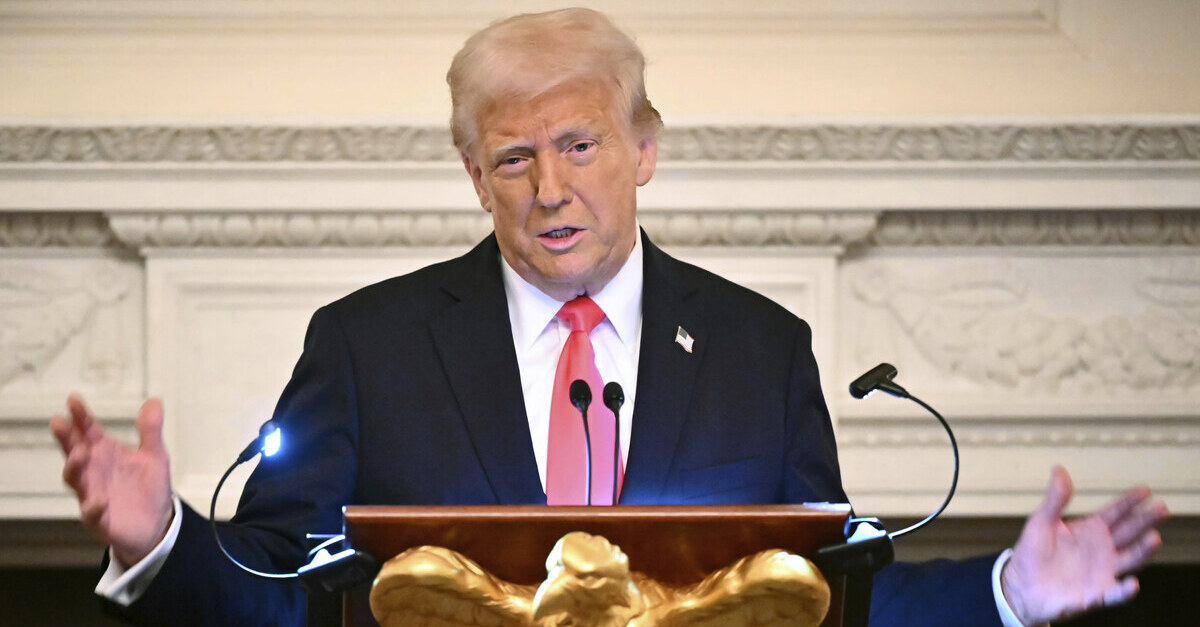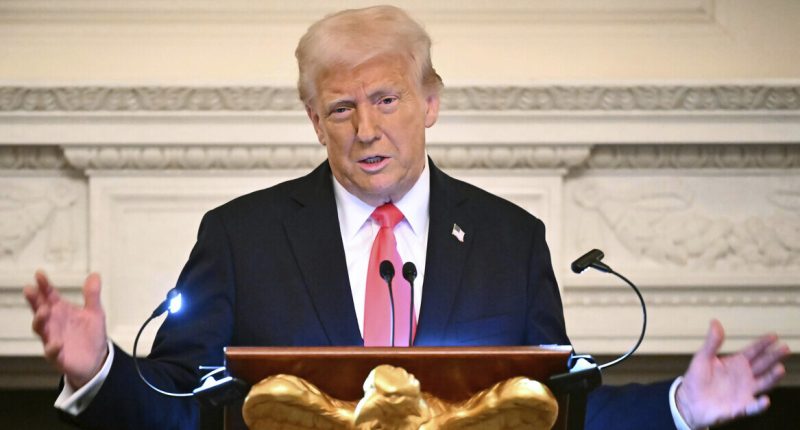
President Donald Trump gestures as he speaks during an Iftar dinner in the State Dining Room at the White House in Washington, Thursday, March 27, 2025 (Pool via AP).
A coalition of immigrant rights and liberal legal advocacy groups is imploring the U.S. Supreme Court to reject President Donald Trump‘s appeal of several lower court orders that bar the government from enacting any of its expressed plans to ban birthright citizenship.
In a 49-page opposition to the Trump administration’s application for a partial stay, the lead plaintiffs in one of three so-far-successful efforts to stop the ban say there is simply “no emergency warranting” the issuance of an emergency stay of the district court’s injunction.
“The government invokes this Court’s emergency docket without identifying any emergency,” the Friday motion reads. “The government can show no harm whatsoever from the district court’s injunction, which merely requires the Executive Branch to continue complying with the settled interpretation of the Citizenship Clause during the pendency of this litigation.”
In Maryland, Washington and Massachusetts, federal judges have issued orders prohibiting federal agencies from implementing or enforcing Trump’s Executive Order 14160.
While the government sued for relief to undo each of the three separate pauses in the same application, each of those three cases is now docketed differently — and consecutively. The likely upshot, however, is that each case is consolidated into the same general controversy — if and when the justices decide to hear oral arguments.
The Trump administration’s appeal largely eschews the merits of the underlying birthright citizenship policy in favor of fighting over the propriety of the district court injunctions stopping the ban.
The government says the “universal injunctions” in each of those three cases generally harm the government in various ways unrelated to immigration and have specifically harmed states that want the ban on birthright citizenship enforced.
The plaintiffs in the case stylized as Trump v. CASA say the government’s strategy should not be countenanced because of the “most fundamental right” at stake in the litigation.
“There is nothing ‘modest’ about the government’s request for emergency relief in this case,” the filing reads. “On his first day in office, the President issued an Executive Order that purports to upend birthright citizenship by executive fiat. But birthright citizenship is at the core of our Nation’s foundational precept that all people born on our soil are created equal, regardless of their parentage.”
The opposition motion criticizes the Trump administration for eliding the merits, while premising its request for a stay on the idea that “irreparable harm” will ensue unless the injunctions are dissolved.
“If the Court were to grant the government’s motion, chaos would ensue,” the motion continues. “The President cannot rewrite the Constitution or the Immigration and Nationality Act by executive fiat, and the government has certainly shown no extraordinary need to do so immediately.”
Meanwhile, the plaintiffs say, each of the three district courts that issued the injunctions has grappled with the merits.
“As every court to have considered the issue has concluded, the Executive Order facially violates the Constitution,” the motion continues. “The government does not challenge any of that before this Court. It does not argue that it is likely to succeed in defending the constitutionality of the Executive Order. And yet, the government asks this Court to intervene to lift the injunction so that the government may begin applying the facially unconstitutional Order against nearly everyone. That is not a modest request.”
More Law&Crime coverage: ‘This unlawful impost must fall’: Conservative group sues Trump claiming tariffs are ‘unconstitutional exercise of legislative power’
CASA goes on to argue for the necessity of a universal injunction.
“The universal injunction in this case preserves the uniformity of United States citizenship, an area in which nationwide consistency is vitally important,” the motion continues. “Whether a child is a citizen of our Nation should not depend on the state where she is born or the associations her parents have joined.”
The Trump administration, in seeking relief, reiterated prior arguments that, if the injunctions do stand, they should only apply “to the parties actually before the courts.” Here, that would effectively limit the injunction to a handful of states and members of groups like CASA.
The plaintiffs argue that limiting the injunction as the government proposes would create an untenable state of affairs in the country.
From the motion, at length:
Matters on the ground would be even worse if an injunction were to apply in some states but not others. Such an arrangement would threaten to fundamentally fracture the country. If a child’s citizenship depended on the state in which they were born, it would create a situation much like the one that existed between slave and free states, which produced Dred Scott and ultimately the Civil War. An infant would be a United States citizen and full member of society if born in New Jersey, but a deportable noncitizen if born in Tennessee. The Reconstruction Amendments, including the Citizenship Clause, were intended to prevent that sort of division between the states from ever occurring again. The Court should not now exercise its equitable power to re-create a situation in which a person’s fundamental right to citizenship depends on the state in which they are born.
Love true crime? Sign up for our newsletter, The Law&Crime Docket, to get the latest real-life crime stories delivered right to your inbox.
In contrast to the government’s motion, which avoided arguing the merits, the plaintiffs, led by CASA, used the opportunity to push a broadside argument that birthright citizenship is a constitutional “bedrock” of the United States.
“Congress passed and the States ratified the Citizenship Clause of the Fourteenth Amendment to enshrine birthright citizenship in the Constitution, where no President could unilaterally take it away,” the motion goes on. “The Executive Order purports to reinterpret the Fourteenth Amendment to limit citizenship by birth on our soil to only those children who have at least one parent who is a citizen or lawful permanent resident. But that is not birthright citizenship at all. The Order’s rule of citizenship by blood is inconsistent with not only the plain text of the Citizenship Clause, but also common law history, this Court’s precedent, a federal statute codifying the long-settled interpretation of the Citizenship Clause, and well over a century of consistent Executive Branch practice.”







